The Prom Concert on August 10, given by the BBC Symphony, conducted by Edward Gardner, included two first performances, both of them commissioned by the BBC for this season of the Proms. These were among the 13 first performances and 7 UK first performances on the Proms this season.
 Michael Berkeley’s Slow Dawn is a revision and reorchestration of a work written three years ago for wind band, which had been commissioned by the British conductor and horn player Tim Reynish as a memorial piece for his son William. Berkeley intended it as a depiction of dawn in Wales where he lives, and follows the deliberate and inexorable tread of the sun from the first hints of light through its early appearance with to its full presence with stabbing rays of daylight. This sunrise is a long way from Daphnis and Chloe (or, for that matter, from Sibelius’s Night Ride and Sunrise, which preceded this piece on this program). Here the focus is on the tread of ‘the kind old sun’ (as Berkeley says, quoting Wilfred Owen) in its endless recurrence and its complete disregard for more transient human concerns. Starting with deliberate slow dirge rhythm in the percussion, which recurs periodically over the its course, the tonalish work builds, via lines which are increasingly quicker and more agitated, over a dense, very closely spaced harmonic texture to a violently rhythmic climax; it leaves a dramatic and satisfying impression.
Michael Berkeley’s Slow Dawn is a revision and reorchestration of a work written three years ago for wind band, which had been commissioned by the British conductor and horn player Tim Reynish as a memorial piece for his son William. Berkeley intended it as a depiction of dawn in Wales where he lives, and follows the deliberate and inexorable tread of the sun from the first hints of light through its early appearance with to its full presence with stabbing rays of daylight. This sunrise is a long way from Daphnis and Chloe (or, for that matter, from Sibelius’s Night Ride and Sunrise, which preceded this piece on this program). Here the focus is on the tread of ‘the kind old sun’ (as Berkeley says, quoting Wilfred Owen) in its endless recurrence and its complete disregard for more transient human concerns. Starting with deliberate slow dirge rhythm in the percussion, which recurs periodically over the its course, the tonalish work builds, via lines which are increasingly quicker and more agitated, over a dense, very closely spaced harmonic texture to a violently rhythmic climax; it leaves a dramatic and satisfying impression.
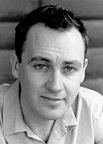 Gaudete by Scottish composer Stuart MacRae is an almost half hour long piece for soprano and large orchestra, setting poems from the book of the same name by Ted Hughes. The piece begins with very arresting ferociously clattering music for the full orchestra which gradually clears to reveal the soprano singing stratospherically high without words. All of this is very effective and it all lands with something of a thud as soon as attention is turned to words, when the voice part, along with everything else, becomes labored and constricted, in terms of both rhythm and tempo.
Gaudete by Scottish composer Stuart MacRae is an almost half hour long piece for soprano and large orchestra, setting poems from the book of the same name by Ted Hughes. The piece begins with very arresting ferociously clattering music for the full orchestra which gradually clears to reveal the soprano singing stratospherically high without words. All of this is very effective and it all lands with something of a thud as soon as attention is turned to words, when the voice part, along with everything else, becomes labored and constricted, in terms of both rhythm and tempo.
This actually seemed to me to set the pattern for the piece, with instrumental music in what might be described as a high modernist style, managed in a very dramatically effective and masterly way, is cut short and undercut by vocal writing which is much less skillful, much less effective, and as a result, tends to come off much more as merely dealing in cliches of that same high modernist style, with endless jagged lines covering enormous registral stretches in jerky rhythms. At one point, when the text says “He never stops trying to dance, trying to sing,” when the singer launches into long melissmas of a sort of new music yodelling, one could imagine that the idea was to depict the failed effort described by the words, but the music is so much like all the rest of the voice part that it’s not possible to be completely sure whether that might be the composer’s intentions. It wasn’t clear to me exactly what the subject matter of the Hughes, as represented by the texts used or as discussed at some length in MacRae’s program notes, might be (and further rereading after the fact didn’t make things any clearer).
As the piece progressed I began to wish that MacRae had simply written a completely instrumental piece, somewhat shorter, that evoked whatever it was we were supposed to get out of the texts, and left the words out altogether. Had he done that, and had that meant leaving out the soprano (as opposed to having a wordless voice part, which could have been very effective), on the other hand, it would have been a loss, since it would have meant not having heard the really wonderful singing of Susanne Andersson, who always sang beautifully, and managed to make practically all the words comprehensible, despite all the obstacles MacRae had put in her path. (more…)
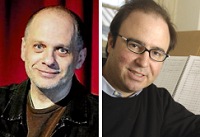 Big Ups to David Lang and Christopher Theofanidis who have just been appointed to the faculty of the Yale School of Music. They will teach graduate students in the school’s composition program as well as teach courses and participate in the performances of their works. Both earned masters and DMA degrees from the Yale School of Music before embarking on their illustrious careers.
Big Ups to David Lang and Christopher Theofanidis who have just been appointed to the faculty of the Yale School of Music. They will teach graduate students in the school’s composition program as well as teach courses and participate in the performances of their works. Both earned masters and DMA degrees from the Yale School of Music before embarking on their illustrious careers.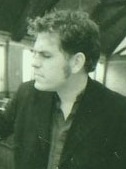 It’s been three years since the human and moral disaster that was Hurricane Katrina overran New Orleans and uncovered an ugly blight on America’s soul. To help make sure that nobody forgets, New Amsterdam Records will release a digital version of Ted Hearne’s powerful work Katrina Ballads on August 29.
It’s been three years since the human and moral disaster that was Hurricane Katrina overran New Orleans and uncovered an ugly blight on America’s soul. To help make sure that nobody forgets, New Amsterdam Records will release a digital version of Ted Hearne’s powerful work Katrina Ballads on August 29. Among the focuses of the Proms this summer are the centennials of Elliott Carter and Olivier Messiaen and the eightieth birthday of Karlheinz Stockhausen (due to his death in 2007, the celebration of his birthday was fused with a commemoration of his life’s work). Although the first night concert included the first performance of a Proms commission from Carter, the piano piece Caténaires, he is only represented by three other works, the Oboe Concerto, Night Fantasies, and Soundings, as opposed to eighteen works of Messiaen, several of them, including the opera St. Francis of Assisi, to be played on September 7, major works of considerable length. The Stockhausen celebration included a Stockhausen day on August 2, which included performances of Gruppen and Stimmung, among other pieces, as well as a performance of Punkte on August 22, which was his actual birthday.
Among the focuses of the Proms this summer are the centennials of Elliott Carter and Olivier Messiaen and the eightieth birthday of Karlheinz Stockhausen (due to his death in 2007, the celebration of his birthday was fused with a commemoration of his life’s work). Although the first night concert included the first performance of a Proms commission from Carter, the piano piece Caténaires, he is only represented by three other works, the Oboe Concerto, Night Fantasies, and Soundings, as opposed to eighteen works of Messiaen, several of them, including the opera St. Francis of Assisi, to be played on September 7, major works of considerable length. The Stockhausen celebration included a Stockhausen day on August 2, which included performances of Gruppen and Stimmung, among other pieces, as well as a performance of Punkte on August 22, which was his actual birthday.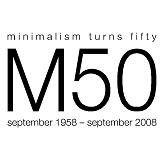
 Lazy, hazy summer days… Not much really happening, unless you hoof it to some festival or other… Or, for the price of simply wearing out your finger clicking, you could spend the better part of the next couple weeks feasting on the treasure trove that is the
Lazy, hazy summer days… Not much really happening, unless you hoof it to some festival or other… Or, for the price of simply wearing out your finger clicking, you could spend the better part of the next couple weeks feasting on the treasure trove that is the 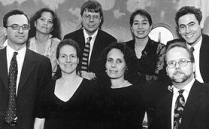 Dear Friends,
Dear Friends, Michael Berkeley’s Slow Dawn is a revision and reorchestration of a work written three years ago for wind band, which had been commissioned by the British conductor and horn player Tim Reynish as a memorial piece for his son William. Berkeley intended it as a depiction of dawn in Wales where he lives, and follows the deliberate and inexorable tread of the sun from the first hints of light through its early appearance with to its full presence with stabbing rays of daylight. This sunrise is a long way from Daphnis and Chloe (or, for that matter, from Sibelius’s Night Ride and Sunrise, which preceded this piece on this program). Here the focus is on the tread of ‘the kind old sun’ (as Berkeley says, quoting Wilfred Owen) in its endless recurrence and its complete disregard for more transient human concerns. Starting with deliberate slow dirge rhythm in the percussion, which recurs periodically over the its course, the tonalish work builds, via lines which are increasingly quicker and more agitated, over a dense, very closely spaced harmonic texture to a violently rhythmic climax; it leaves a dramatic and satisfying impression.
Michael Berkeley’s Slow Dawn is a revision and reorchestration of a work written three years ago for wind band, which had been commissioned by the British conductor and horn player Tim Reynish as a memorial piece for his son William. Berkeley intended it as a depiction of dawn in Wales where he lives, and follows the deliberate and inexorable tread of the sun from the first hints of light through its early appearance with to its full presence with stabbing rays of daylight. This sunrise is a long way from Daphnis and Chloe (or, for that matter, from Sibelius’s Night Ride and Sunrise, which preceded this piece on this program). Here the focus is on the tread of ‘the kind old sun’ (as Berkeley says, quoting Wilfred Owen) in its endless recurrence and its complete disregard for more transient human concerns. Starting with deliberate slow dirge rhythm in the percussion, which recurs periodically over the its course, the tonalish work builds, via lines which are increasingly quicker and more agitated, over a dense, very closely spaced harmonic texture to a violently rhythmic climax; it leaves a dramatic and satisfying impression. Gaudete by Scottish composer Stuart MacRae is an almost half hour long piece for soprano and large orchestra, setting poems from the book of the same name by Ted Hughes. The piece begins with very arresting ferociously clattering music for the full orchestra which gradually clears to reveal the soprano singing stratospherically high without words. All of this is very effective and it all lands with something of a thud as soon as attention is turned to words, when the voice part, along with everything else, becomes labored and constricted, in terms of both rhythm and tempo.
Gaudete by Scottish composer Stuart MacRae is an almost half hour long piece for soprano and large orchestra, setting poems from the book of the same name by Ted Hughes. The piece begins with very arresting ferociously clattering music for the full orchestra which gradually clears to reveal the soprano singing stratospherically high without words. All of this is very effective and it all lands with something of a thud as soon as attention is turned to words, when the voice part, along with everything else, becomes labored and constricted, in terms of both rhythm and tempo.
 Here’s a big loss to the New York new music community.
Here’s a big loss to the New York new music community.